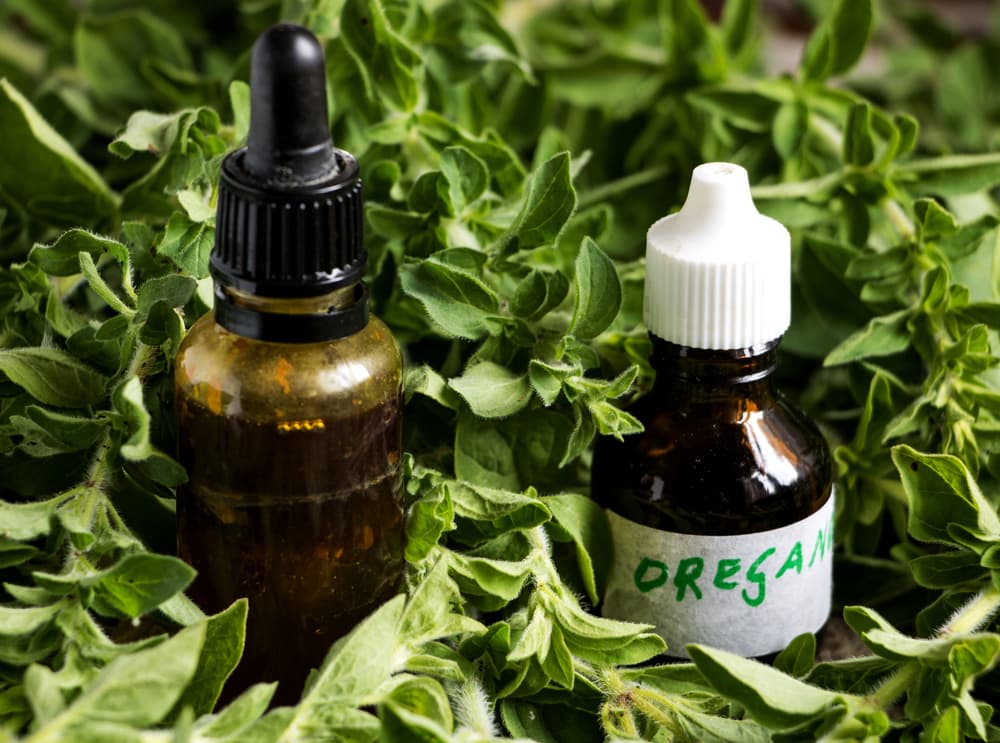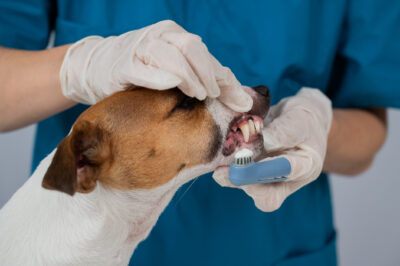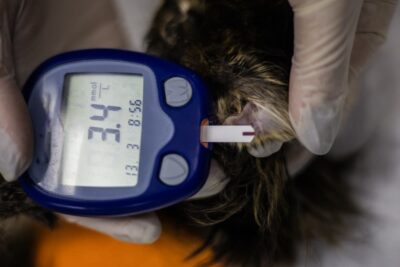Oregano Oil for Dogs: Benefits and Uses

In humans, oregano oil has begun to be widely studied for its potential health benefits. Its antimicrobial and immune-supportive properties have given this essential oil a variety of potential uses for humans. But does oregano oil for dogs offer benefits to our canine companions, too?
Pet parents should always use care when using essential oils, products containing essential oils, and essential oil diffusers in their homes. And they should never use these products without the guidance or consultation of a trusted veterinarian.
But as pet parents seek more natural options for their furry family members, oregano oil may be one remedy worth exploring for targeted ailments, ranging from ear infections to skin problems.
What is Oregano Oil?

Oregano oil is an essential oil that’s derived from oregano, a flowering plant in the mint family. However, finding oregano oil for dogs isn’t as easy as taking a trip to your kitchen’s spice rack. Oregano oil is prepared through a complex process where the leaves and flowers of the plant are air dried, and the oils are extracted and concentrated through steam distillation.
The essential oil itself is a mixture of chemical compounds. Carvacrol and thymol—oregano oil’s two most powerful compounds—hold the keys to its potential medicinal benefits. Recent studies show carvacrol to be a powerful antibacterial agent, while thymol is a natural antifungal believed to also help support the immune system.
Historically, the use of plants in medical treatment, including oregano, harkens back centuries.
“Oils, herbs, and plants have been used for thousands of years with animals all over the world, and parallels its history in human medicine and therapy,” says Dr. Janet Roark, a veterinarian based in Austin, Texas. “It was not until the late 18th century that chemists started extracting the active ingredients from plants to develop modern day synthetically prepared medications. And it wasn’t until the late 19th century that veterinary medicine turned from treating animals herbally to using conventional pharmaceuticals.”
As pet parents research oregano oil for dogs, they may also see the product referred to as “oil of oregano,” which means it has been diluted in a carrier dilution oil, like grapeseed oil, olive oil, or coconut oil. These diluted oils of oregano are not the same as pure oregano oil.
Working with a veterinarian and understanding the different forms that oregano oil may be found in is crucial to ensuring the product is used safely and properly on your dog.
Oregano Oil Benefits for Dogs

Integrative and holistic veterinarians have found that the properties that make oregano oil an appealing treatment for humans—including its antimicrobial and immune supportive properties—can potentially make oregano oil a compelling part of a treatment course for dogs.
“The oregano herb and the essential oil have health supporting properties, including antiviral, antibacterial, antifungal, anti-parasitic, anti-inflammatory, and immune-supportive,” says integrative veterinarian Dr. Jodie Gruenstern, who is based in Arizona.
These benefits have been the subject of further scientific exploration of oregano oil on a number of dog-related health issues. One September 2019 study from Veterinary Dermatology took a deeper look at oregano oil’s impact on otitis externa (a.k.a ear infections), and found the oil’s antibacterial and antifungal properties to be a suitable treatment against nearly 100 different isolated bacterial strains, including some with known resistance to proven antibiotics.
Oregano oil’s apparent versatility has led to its use against a wide range of targeted ailments, including difficult skin conditions, ear issues, and skin irritations and growths like skin tags and warts. In other instances, veterinarians have even used oregano oil for dogs with more traditional treatments like antibiotics to maximize results.
How to Give Oregano Oil to Dogs

Oregano oil can be given to dogs externally, internally, or through diffusion. Its application depends on its intended use, and all applications should be undertaken with extreme care and in coordination with a trained veterinarian to ensure your pet’s safety.
“Oregano oil is a ‘hot oil,’ and can chemically burn tissue,” says Dr. Gruenstern, if it’s not used appropriately.
Oregano Oil for Topical Use in Dogs
Skin issues, like warts or growths, will require a topical treatment. Undiluted oregano oil, a preparation sometimes referred to as “neat,” or oregano oil diluted in a fatty oil carrier may be used in these instances, with very small amounts applied to the growths being targeted.
“General dilution guideline is one part oregano essential oil to four parts fatty carrier oil,” says Dr. Gruenstern. “I’ve recommended to some experienced pet parents that they can try a drop of oregano essential oil on a toothpick to small skin growths to remove them, much like a variety of preparations on the market for removing warts.”
In cases of topical application, pet parents should make sure their dog doesn’t ingest the oil directly.
Integrative veterinarians like Dr. Gruenstern and Dr. Roark have also used oregano oil in the treatment of a variety of ear conditions. But ear issues can be complex, and so these applications should always be taken on in coordination with a veterinary professional.
“Any essential oil that contacts the [ear drum] can cause excruciating pain,” says Dr. Gruenstern. “There are some commercial preparations labeled to be applied inside the ear canal that contain essential oils such as oregano oil, but these are heavily diluted with carrier oils. I don’t recommend a pet parent risk making their own concoction.”
“The ear is a very sensitive body part and any substance can be toxic if placed in an unprotected ear,” adds Dr. Clarke Garthwaite. “It’s important to always have a veterinarian examine a dog’s ear prior to administering any product to make sure the eardrum is intact and that the skin inside is not too damaged.”
Oregano Oil for Internal Use in Dogs
Beyond ear issues, other oral applications require oregano oil to be diluted prior to administration. The oil should be diluted properly in a fatty carrier oil per the dilution guidelines, and can be mixed in with food.
Oregano oil has also been found in treats and other products on the market as a natural preservative that supports digestive health.
“Dogs have consumed this oil diluted in a capsule and in foods,” says Dr. Gruenstern. “Oregano and rosemary are common in many foods and treats,” adds Dr. Roark.
Is Oregano Oil Safe for Dogs?
Oregano oil, when applied and diluted properly, can be safe for dogs. Its status as a “hot” oil, however, means it has the potential to burn if it isn’t diluted and applied properly. As with any new medication, oregano oil should not be administered to your dog without the express guidance of your veterinarian. And your dog should be monitored after administration for any ill effects.
Skin irritations are the most common adverse side effect, and so pet parents should be on the lookout for anything indicative of inflamed tissue, like redness, itching, or burning sensation. Skin irritations should typically resolve themselves in 24-48 hours. And if irritation does occur, avoid using water to try and remedy the irritation.
“If an essential oil irritation develops it should not be rinsed with water,” says Gruenstern. “Instead, you should dilute it further with a fatty carrier oil. Water will make it worse!”
Oregano oil use should be stopped if your dog shows signs of distress affiliated with its use. Signs to look out for include:
- Drooling
- Squinting
- Rubbing their face
- Vocalization
- Shaking
- Vomiting
- Diarrhea
Contact your veterinarian immediately if you feel your dog is experiencing sustained signs of distress.
How to Choose Oregano Oil for Dogs

The use of essential oils like oregano oil for dogs shouldn’t be taken on lightly. And pet parents should work with a veterinarian who knows the space well to make an informed decision.
“There is pretty limited formal research on the use of essential oil products in dogs so we don’t truly understand all the benefits and risks,” cautions Garthwaite. “There are lots of vets with tons of experience using these products, whereas others are less familiar.”
While navigating the world of essential oils for dogs can be dizzying, Gruenstern provides some guidance for pet parents as they research oregano oil for dogs.
“Department and grocery store essential oils should never be used on pets,” she says. “Just because an oil is labeled organic does not mean it is safe for pets. And just because a manufacturer puts a pet label on an oil or a blend does not make it different or any better than that same oil sold for humans.”
Per Gruenstern, the quality of the plant is what creates an effective essential oil. “It is the choice of seed, the nurturing during growth, the time of harvest and the proper distillation that creates a safe and useful essential oil.”
To this end, she advises pet parents to spend time investigating the manufacturer and the company behind the product. Ask yourself the following questions:
- Is the brand you’re choosing transparent?
- Do they control the entire process from seed selection to bottling and labeling?
- Is it a company you can trust, providing literature on how to administer the products and working with practitioners that can share their experiences and recommendations?
- Does the oregano oil contain the active beneficial ingredient, carvacrol? Effective oregano oil should contain 60-75% carvacrol.
In addition to any individual research, pet parents should always work directly with their trusted veterinarian to determine if a specific product or treatment is right for their dog.









